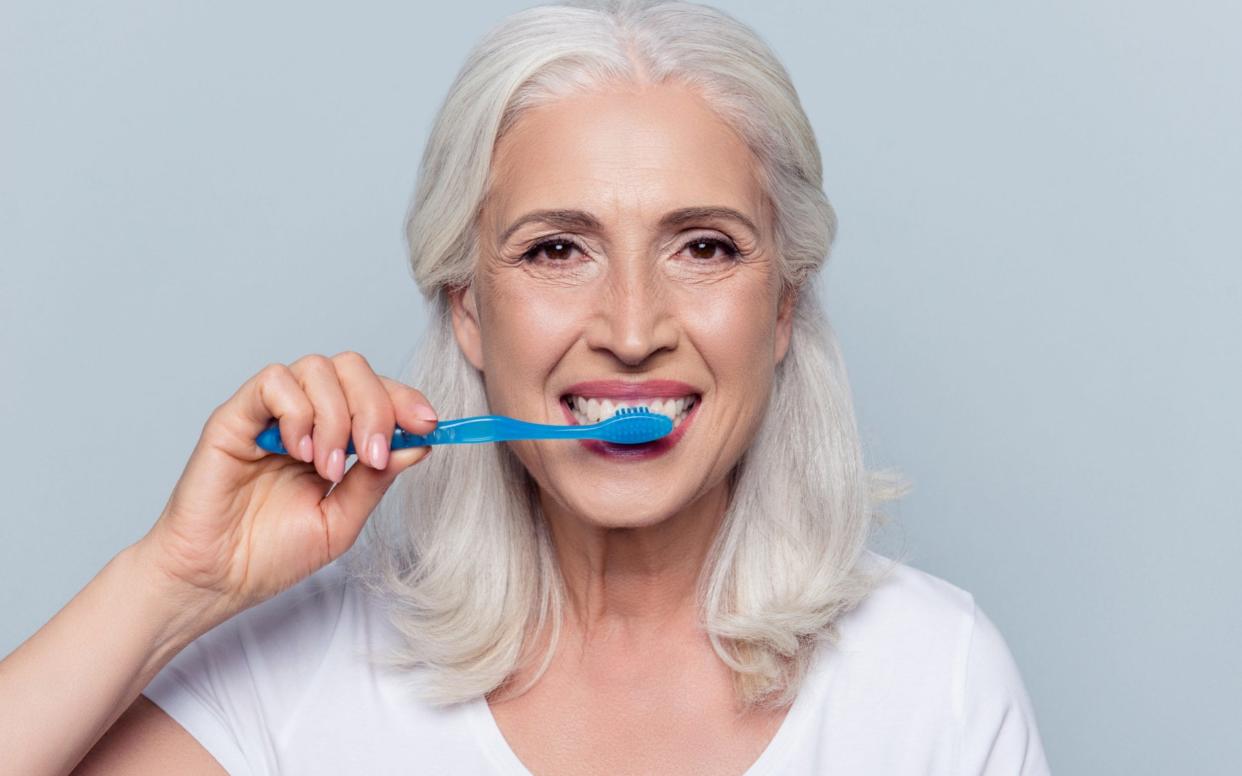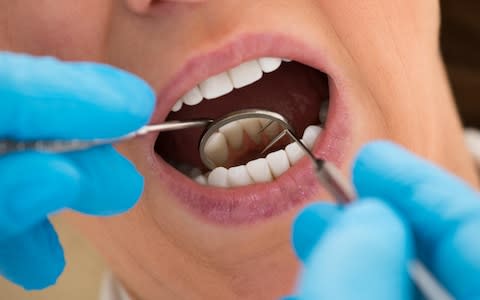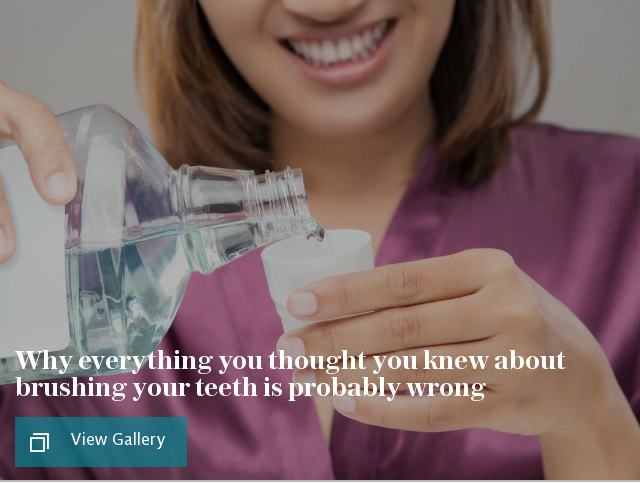The good teeth guide: how to keep your whites pearly in midlife and beyond

Are you feeling a bit ‘long in the tooth’? While you're probably familiar with the phrase – used to describe, perhaps a little unkindly, someone who is old or of advancing years – you may not know its quirky etymology. We inherited the curious dental expression from horses, whose teeth, unlike humans’, continue to grow throughout their lifetimes, making the length of a horse’s tooth a reasonably reliable yardstick of its age, a bit like rings on a tree stump.
Although human teeth stop growing in our early twenties, they often appear to be getting longer because our gums recede as we age, thereby exposing more of our teeth. Gum recession can occur as a consequence of gum disease and can also lead to increased tooth sensitivity. This is just one of the adverse effects of the ageing process on our dental health.
Other major challenges for older teeth include: discolouration and staining (which is accentuated by the fact that the enamel surface of our teeth becomes more translucent and ‘glassy’ over time); the erosion and flattening of the crowns of our teeth through decades of attritional grinding and chewing; and, perhaps most worryingly of all, a drop in the quantity and quality of our naturally produced saliva.
If you can stomach the metaphor, saliva is our mouths’ engine oil: it lubricates, protects and restores our teeth 24 hours a day. So when our body starts to produce less saliva as we age, this can lead to some serious problems, including a rise in the amount of bacteria in our mouths that cause tooth decay and bad breath (halitosis).
Thankfully, there is now an enormous amount you can do to protect your teeth and keep them merrily chomping all the way to your 100th birthday and beyond. So to help you on your way, here is our seven-point dental health plan for the over 50s:
1. It’s never too late
It’s an unfortunate irony that most people visit the dentist regularly during childhood (thanks to the chivvying of their loving parents) but fall out of this invaluable habit in their forties and fifties – just at the period in their lives when ageing teeth need the most care and attention. Indeed, according to the UK’s most recent Adult Dental Health Survey, 29 percent of 55 to 64 years-olds suffer from active tooth decay, with the figure rising to 40 percent for 75 to 84 year-olds. Meanwhile, just one per cent of people aged between 54 and 74 have oral health that could be described as excellent. Even more alarmingly, less than 50pc of the population regularly visit a dentist.
Collectively, older generations spend millions of pounds in the UK each year looking after (and in some cases even replacing) their hair and skin to keep them looking vibrant and healthy. So why don’t we lavish a similar amount of money, time and care on our teeth? The best way to start doing this is by booking an appointment with your dentist, who will be delighted to see you even if your last visit was in school uniform.
The good news is that we are now keeping our teeth longer: in 1978, a staggering 48pc of 55 to 64 year-olds had no teeth at all, while by 2009 this figure had dropped to six percent. Think of regularly visiting a dentist during your forties, fifties and sixties as a bit like paying into a pension: it’s an investment in the future that will make you (and your smile) happier and healthier in the decades to come.
In partnership with a hygienist, your dentist will be happy to create a bespoke plan for how to take preventative care of your teeth as they age.

2. Use an electric toothbrush...
Many older readers will have grown up using a traditional toothbrush and – used correctly – this can still be an effective method of brushing. However, we strongly recommend going electric, because electric toothbrushes do more of the hard work for you and are usually more efficient in removing that unwanted sticky plaque from the surface of your teeth. The latest models have in-built timers to tell you when to start and stop brushing (two minutes is ideal) and are ergonomically designed, making them even easier to hold and manoeuvre around your mouth, especially if you suffer from arthritis.
You should also make sure you brush directly over a sink and that your mouth and lips are relaxed as you brush. If they are and you are brushing thoroughly, you will dribble – hence the importance of standing over a sink! Whereas if your lips remain taught during brushing, you are unlikely to be able to direct your brush into all the right places, especially along the gum line. In short, don’t worry about making a mess while brushing – it’s a sign you’re doing it properly.

3. ...and a magnifying mirror
Another essential purchase for your bathroom is a large magnifying mirror, so you can see precisely what you’re doing as you brush, especially in the areas of your mouth that are hard to reach.
If you would like to read more tips and tricks on how to clean your teeth effectively, read our guide to ‘The best way to brush your teeth (and the simple mistakes millions are making every day)’.
4. Taking care of sensitive teeth
Many of our patients find that their teeth become more sensitive as they grow older. This is mostly because gum recession exposes the roots of our teeth, which are more sensitive to acidity and extremes of temperature.
Using a desensitising toothpaste that has been specifically designed for sensitive teeth will certainly help. We also recommend taking a pea-sized quantity of desensitising toothpaste on your finger and rubbing it onto the sensitive area after brushing each evening and leaving it overnight. Repeat this method for a month and you should feel a marked improvement.
5. The significance of saliva
As we approach our sixties, one of the little-known but highly significant changes to our body is that our mouths start to produce less saliva. This can have a serious impact on our dental health, as saliva is our first line of defence against tooth decay and halitosis. But don’t worry: there are several things you can do to compensate.
First, stay hydrated – drinking small amounts of water throughout the day will help support your saliva’s ongoing battle with bacteria. An occasional glass of milk is also recommended because it is almost pH neutral and contains calcium and phosphates – which is what your teeth are made of – and can therefore help to ‘remineralise’ your teeth. However, don’t drink milk last thing at night because milk also contains natural sugars which bacteria can metabolise to cause tooth decay if they’re left to stagnate on your teeth overnight.
Second, try to stimulate your mouth to produce more saliva in the first place by chewing on gum or sucking on a mint or pastille. Though don’t forget: these must of course be sugar-free! (This is our particular area of expertise. We helped to formulate Dr. Heff’s Remarkable Mints, a sugar-free dental health mint that stimulates saliva production, freshens breath and cleans teeth.)

6. Looking after your dentures
Dentures are a removable plate or frame that holds one or more artificial teeth and although nearly one in five UK adults wears removable dentures of some description (according to a 2009 survey), we feel that even more people would benefit from wearing them.
If you do have dentures, make sure you take just as good care of them as you would your natural teeth. Dentures can easily become a breeding ground for bacteria and sticky plaque, so cleaning them regularly is essential – using soap and water with a soft denture brush is ideal. It is also crucial to make sure that your dentures fit properly. While travelling on trains and buses, we often see people suffering with soreness on the corners of their lips (the medical name for this is ‘angular cheilitis’). This is usually caused by the support underneath a full set of dentures shrinking, so that part of the face and lips drop, which also makes people look older than they should.
The solution is to go to see your dentist, who can improve the height and fit of your dentures so that they give your face and lips the correct support and eradicate any soreness of the lips. We recommend that people with partial dentures should see a dentist every six months, while those with full dentures should visit their dentist at least once a year.
7. Keeping your whites pearly
Thanks to decades of chewing, chomping, sucking and slurping, it’s no surprise that our teeth can become stained and discoloured over time. There are lots of over-the-counter products that promise cleaner, whiter teeth but we in general they won’t actually whiten your teeth. Instead, they merely remove superficial stains.
Your dentist, on the other hand, can provide a whitening gel that will actually whiten your teeth, as well as offering a range of other treatments to rejuvenate them, including applying composite bonding (which is a tooth-coloured filling that masks discoloured parts of the tooth), veneers (which are ceramic facings applied to the front of the tooth for that whiter-than-white Hollywood smile) and crowns (which are complete ceramic restorations that cover the whole of the tooth).
It is also important to remember that there is no upper age limit on adjusting the positioning and alignment of your teeth (known as orthodontics) to make them more comfortable or attractive. Many of our older patients sadly missed out on the benefits of modern orthodontics when they were growing up. They are usually delighted to discover that 21st-century orthodontic aids are far less visible - and more comfortable to wear - than the unsightly “train-tracks” they remember from childhood.
Indeed, we now often see grandparents sitting together with their own grandchildren in our orthodontist’s waiting room ahead of their respective appointments. It is a heartwarming sight - at least for us dentists.
Dr. Mike Heffernan and Dr. Toby Edwards-Lunn are practising dentists with more than 50 years’ combined experience. They also led the team of dental health researchers and academics who invented Dr. Heff’s Remarkable Mints.

 Yahoo News
Yahoo News 
